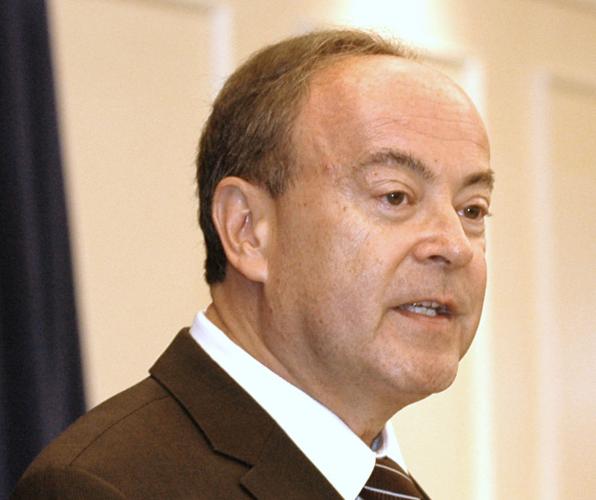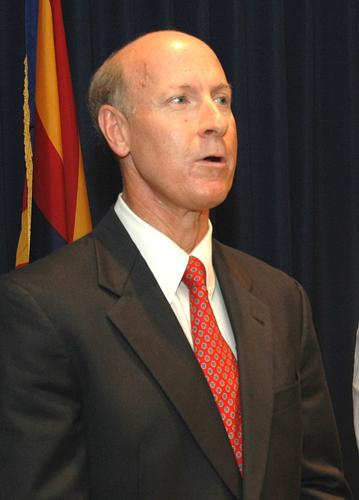PHOENIX — Upset with a ruling that knocked a tax hike for education off the ballot, some education advocates are trying to get voters to turn one or two Supreme Court justices out of office in November.
Teresa Ratti said the conclusion by the justices that the wording of the Invest in Ed initiative was misleading was "the exact same statement'' that came from the Republican-controlled Legislative Council which was tasked with writing an explanation of the proposal.
"Do we really have a separate judiciary branch or is our judicial branch being controlled or influenced by the executive and the Legislature,'' she asked.
So Ratti, a high school government teacher, is using a constitutional provision on how judges are chosen in Arizona to urge people to oust Clint Bolick and John Pelander. They are the two of the seven justices whose terms are up this year.
Jennifer Hilsbos, another SOS member, is focusing solely on Bolick.
Ideally, Hilsbos said, she would like to get rid of the two newest justices who Gov. Doug Ducey got to name after the Republican-controlled Legislature agreed to expand the court from five to seven members. She said Ducey effectively was packing the court with his choices.
But neither John Lopez nor Andrew Gould are up for election this year. So that leaves her to take out her wrath on Bolick, who Ducey named to the high court in 2016.
Anyway, she notes, Pelander was tapped for the court by Jan Brewer, Ducey's predecessor. But if Pelander is removed and Ducey gets reelected, that gives the current governor a chance to name yet another member of the court.
The system, approved by voters in 1974, sets up a process where the judges of the Supreme Court, Court of Appeals and superior courts of Pima, Pinal and Maricopa counties are named through what is known as a "merit selection'' process.
A special panel reviews applicants and forwards the names of nominees to the governor who must choose from that list. Then, as terms expire, the judges stand for reelection on a retain-or-reject basis. If they are turned out, the process starts all over.
In the entire history of the system, only two judges have been removed, one from the Court of Appeals and one from the Maricopa bench. No Supreme Court justice has ever lost an election, though a group that did not like one of his rulings did try to deny Pelander another six-year term in 2012.
The initiative at issue would have increased state income taxes on individual earnings above $250,000. The idea was to create a dedicated revenue stream of about $690 million a year for education.
Backers got more than enough signatures to put the issue on the November ballot.
But in a brief order late last month, Chief Justice Scott Bales said the description provided to petition signers did not inform them of all the implications of the measure, saying "that creates a significant danger of confusion or unfairness.''
It's not just that conclusion that angered education supporters. There was also the fact that Daniel Scarpinato, a campaign aide to Ducey, confirmed that he had told some reporters that the decision was a 5-2 split in a bid to show that the governor's two new appointments didn't make a difference, even though that information is not public.
From the perspective of those seeking to oust the justices, that just confirms their belief there is a pipeline between the high court and the governor's office, one they contend suggests that information also flows the other way.
That "leak'' -- no one from the court will confirm the vote until a formal ruling comes out -- has caused some concern.
Jerry Landau, an aide to the court, said there already is an inquiry into how any information got out.
"I am completely confident that none of the justices communicated that information,'' Bolick told Capitol Media Services. "The notion that any of us would ever divulge a vote breakdown before it was official is flabbergasting.''
Pelander said he knows nothing about it and does not believe it came from any of the justices.
"But if there was any kind of leak it's extremely disappointing and disconcerting to me,'' he said.
The larger question goes to the beliefs of those who want to oust one or two of the justices that the decision to bar a vote on the Invest in Ed measure was political.
Bolick said this isn't like the U.S. Supreme Court where the split on many decisions can be predicted based on the political leanings of the justices. In fact, he said, in those ruling where the Arizona court has been split, the justices do not line up along predictable lines.
For example, a decision last month to allow a developer to use groundwater in Cochise County drew two separate dissents, one from Bolick and one from Bales who was appointed to the high court by Democratic Gov. Janet Napolitano.
Bolick also pointed out that he voted two years ago to overturn a trial court judge and allow a vote on a plan to raise the state minimum wage to $12 an hour by 2020, something that probably did not fit his pre-appointment political philosophy at the Goldwater Institute.
Pelander, on the high court for nine years and an appellate judge for 14 before that, said none of the discussions he has had with colleagues about a pending case has ever been based on politics. And he took particular offense at the idea that he would be opposed to funding public education, pointing out his own background going through public schools, his mother as a teacher and his father serving on a local school board.
The effort to deny Pelander a new six-year term in 2012 was pushed by those who did not like the fact he agreed to allow a public vote creating an open primary system where all candidates run against each other regardless of party affiliation, with the top two advancing to the general election. Two of the other five judges also agreed with that conclusion but Pelander was the only one on the ballot that year.
Despite the campaign against him he still got nearly 1.1 million votes with fewer than 378,000 against him.
Since the retain-or-reject system was adopted, only two judges have been turned out of office.
In 1978, Gary Nelson lost his post on the Court of Appeals. That same year, Maricopa County votes removed Superior Court Judge Fred Hyder.







